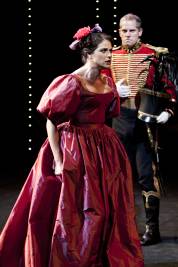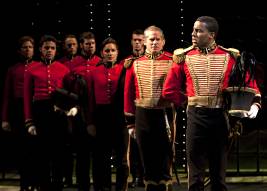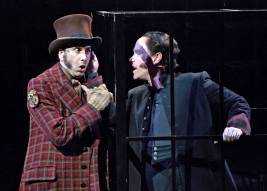
If William Shakespeare has been called an acquired taste, the time has come for this reviewer to confess to having—despite considerable kicking and screaming—acquired a taste for the Bard. No longer can I protest too much, as I have in years past, that (to quote from a 2008 review) “I often get lost in his convoluted plots, whole chunks of dialog whizzing past me or over my head without really sinking in.” Yes, Shakespeare’s plots can still be hard to follow, and yes, there are still passages that even the finest Shakespearean actor cannot render comprehensible to my 21st Century ears, but after having (in the past year alone) raved about productions of A Midsummer Night’s Dream (two of them!), The Comedy Of Errors, Measure For Measure, The Taming Of The Shrew, and The Merchant Of Venice, I’m actually starting to look forward to “Another Op’ning, Another Show.”
The Old Globe 2011 Shakespeare Festival production of Much Ado About Nothing can now be added to the above list, director Ron Daniels and an extraordinarily talented cast having come together to create a truly magical evening of romance and laughter under the San Diego stars.
Like every Shakespeare comedy, Much Ado centers upon pairs of lovers, this time Benedick (Jonno Roberts) and Beatrice (Georgia Hatzis), and Claudio (Kevin Alan Daniels) and Hero (Winslow Corbett). The latter pair meet cute, fall madly in love at first sight and, wasting no time, make plans to be married in a week. As their wedding day approaches, the twosome hatch a scheme with Don Pedro (Donald Carrier), the prince of Aragon, to trick the feuding Beatrice and Benedick into falling for each other by making each believe that the other is already head over heels. Meanwhile, the prince’s illegitimate brother, Don John (Jay Whittaker), wracked with jealousy over Don Pedro’s power and his friendship with Claudio, makes his own plans to prevent Claudio and Hero’s wedding from ever taking place.
Director Daniels has set this Much Ado in the early 1800s, allowing costume designer Deirdre Clancy to come up with some sumptuous garb for the cast to sport, the men the epitome of military masculinity as soldiers returning from the battlefield, the ladies looking equally splendid in their puffed-sleeve, full-skirted feminine finery. Ralph Funicello’s set design divides upstage and downstage with a wall of glass-and-metal gates and doors, providing for some visually stunning tableaux when lit to gorgeous effect by Alan Burrett. Dan Moses Schreier’s original music and sound design complete the rich, romantic 19th Century world in which a superb troupe of performers bring Shakespeare’s words to vivid life.
Daniels has conceived this Much Ado as something quite close to a musical, setting a number of the play’s speeches to Schreier’s melodies, performed—often in multipart harmonies—by a vocally adept cast under the accomplished musical direction of Charlie Reuter, with “movement” by Liz Shipman (a highfaluting way of saying that she’s choreographed several splendid dance sequences).
As feuding lovers, the superb (and superbly matched) Hatzis and Roberts ignite the kind of opposites-attract fires that Tracy and Hepburn did so well in their film pairings. Each gets his or her fair share of physical comedy, executed to perfection and audience delight. Like their castmates, the duo make Shakespeare’s words as accessible as it gets—and as contemporary as imaginable, given the differences between Elizabethan and 21st Century English.
Corbett and Daniels provide excellent support in considerably more dramatic roles, Whittaker and Michael Stewart Allen (Borachio) make for deliciously dastardly villains, and Adrian Sparks does some powerful emoting as Hero’s outraged father Leonato. Carrier, Anthony Cochrane (Friar Francis, Sexton), Charles Janasz (Antonio, Verges), Deborah Radloff (Ursula), Ryman Speed (Margaret) and Jonathan Spivey (Conrade) deliver topnotch Shakespearean turns as well.
Shirine Babb (Woman in Leonato’s house), Adam Daveline (the Watch, Soldier), Grayson DeJesus (Soldier), Ben Diskant (Balthazar, Soldier), Christian Durso (The Watch, Soldier), Andrew Hutcheson (The Watch, Soldier), Rachael Jenison (Woman in Leaonato’s House), Jesse Jensen (The Watch, Soldier), Jason Maddy (The Watch, Soldier), and Allison Spratt Pearce (Woman in Leonato’s House) make up a terrific Shakespearean ensemble, in roles that require considerably more from them (singing and dancing to be precise) than is normally the case with the Bard, with DeJesus making a particularly strong impression, vocal and otherwise.
Finally, as self-important bumbler Costable Dogberry, there is the breathtakingly brilliant comedic work of John Cariani, Scenie-winner for his breathtakingly brilliant comedic work in the Old Globe’s The Mystery Of Irma Vep. In a voice that spans octaves in a single utterance, Broadway’s Cariani so dazzles as the incompetent master of malapropisms (“Comparisons are odorous”) and redundancies (“They have committed false report; moreover, they have spoken untruths”) that three of his exits get greeted with spontaneous applause—and deservedly so.
Kudos go also to fight director Steve Rankin, vocal and speech coach Jan Gist, and stage manager Bret Torbeck.
Much Ado About Nothing continues in repertory with The Tempest and Peter Shaffer’s Amadeus throughout most of September in the Old Globe’s outdoor Lowell Davies Festival Theatre, the majority of its cast appearing in all three productions. Together, Beatrice and Benedick (and company) generate enough heat to warm up even these chillier than usual August nights.
Old Globe Theatre, Lowell Davies Festival Theatre, Balboa Park, San Diego.
www.oldglobe.org
–Steven Stanley
August 20, 2011
Photos: Henry DiRocco





 Since 2007, Steven Stanley's StageSceneLA.com has spotlighted the best in Southern California theater via reviews, interviews, and its annual StageSceneLA Scenies.
Since 2007, Steven Stanley's StageSceneLA.com has spotlighted the best in Southern California theater via reviews, interviews, and its annual StageSceneLA Scenies.







 COPYRIGHT 2024 STEVEN STANLEY :: DESIGN BY
COPYRIGHT 2024 STEVEN STANLEY :: DESIGN BY